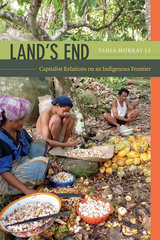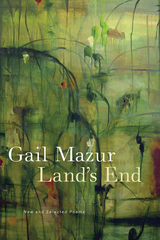2 books about Land's End

Land's End
Capitalist Relations on an Indigenous Frontier
Tania Murray Li
Duke University Press, 2014
Drawing on two decades of ethnographic research in Sulawesi, Indonesia, Tania Murray Li offers an intimate account of the emergence of capitalist relations among indigenous highlanders who privatized their common land to plant a boom crop, cacao. Spurred by the hope of ending their poverty and isolation, some prospered, while others lost their land and struggled to sustain their families. Yet the winners and losers in this transition were not strangers—they were kin and neighbors. Li's richly peopled account takes the reader into the highlanders' world, exploring the dilemmas they faced as sharp inequalities emerged among them.
The book challenges complacent, modernization narratives promoted by development agencies that assume inefficient farmers who lose out in the shift to high-value export crops can find jobs elsewhere. Decades of uneven and often jobless growth in Indonesia meant that for newly landless highlanders, land's end was a dead end. The book also has implications for social movement activists, who seldom attend to instances where enclosure is initiated by farmers rather than coerced by the state or agribusiness corporations. Li's attention to the historical, cultural, and ecological dimensions of this conjuncture demonstrates the power of the ethnographic method and its relevance to theory and practice today.
The book challenges complacent, modernization narratives promoted by development agencies that assume inefficient farmers who lose out in the shift to high-value export crops can find jobs elsewhere. Decades of uneven and often jobless growth in Indonesia meant that for newly landless highlanders, land's end was a dead end. The book also has implications for social movement activists, who seldom attend to instances where enclosure is initiated by farmers rather than coerced by the state or agribusiness corporations. Li's attention to the historical, cultural, and ecological dimensions of this conjuncture demonstrates the power of the ethnographic method and its relevance to theory and practice today.
[more]

Land's End
New and Selected Poems
Gail Mazur
University of Chicago Press, 2020
With her latest poetry collection, Gail Mazur once again shows her mastery of the descriptive-meditative narrative, powerfully evoking the past while writing from the firm ground of the present.
In Land’s End, we see Mazur writing with the kind of lyric authority, ever-deepening emotional range, and intellectual and social scope that her readers have come to expect in her poetry. Beautifully crafted elegies meet with reflections on her own life, her family, and artists who have come and gone. In the title poem, she leads readers through a garden, where new and old growth twists together in an “almanac of inheritances” that conjures the rich memory of poets who have passed on. In this space of remembrance, Mazur also charges us with the responsibility of nurturing art and artists of the future, especially in the face of the disheartening absurdities of contemporary politics. Contemplating the growth and decay so entwined in life, these poems invite us to consider both inevitable brokenness and necessary hope, writing “My work now: to continue learning to absorb the loss, / and live.”
Through tidal creeks and the weightless scenes of ukiyo-e woodcuts, in artists’ studios and along the frozen Charles River, Mazur connects passionately with the world around her. Carrying with her the undeniable presence of loss and of time past, she engages deeply with the present, her historic memory informing a deep concern for contemporary life. Reading Land’s End, we find ourselves with the poet:
In Land’s End, we see Mazur writing with the kind of lyric authority, ever-deepening emotional range, and intellectual and social scope that her readers have come to expect in her poetry. Beautifully crafted elegies meet with reflections on her own life, her family, and artists who have come and gone. In the title poem, she leads readers through a garden, where new and old growth twists together in an “almanac of inheritances” that conjures the rich memory of poets who have passed on. In this space of remembrance, Mazur also charges us with the responsibility of nurturing art and artists of the future, especially in the face of the disheartening absurdities of contemporary politics. Contemplating the growth and decay so entwined in life, these poems invite us to consider both inevitable brokenness and necessary hope, writing “My work now: to continue learning to absorb the loss, / and live.”
Through tidal creeks and the weightless scenes of ukiyo-e woodcuts, in artists’ studios and along the frozen Charles River, Mazur connects passionately with the world around her. Carrying with her the undeniable presence of loss and of time past, she engages deeply with the present, her historic memory informing a deep concern for contemporary life. Reading Land’s End, we find ourselves with the poet:
as if here at land’s end, here on the coast, urgent,
together we’d have energies to do battle forever.
together we’d have energies to do battle forever.
As if we could rescue the guttering world….
[more]
READERS
Browse our collection.
PUBLISHERS
See BiblioVault's publisher services.
STUDENT SERVICES
Files for college accessibility offices.
UChicago Accessibility Resources
home | accessibility | search | about | contact us
BiblioVault ® 2001 - 2024
The University of Chicago Press









